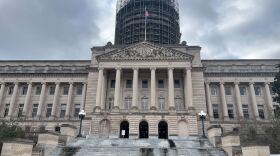Lawmakers studying artificial intelligence are urging steps to protect the integrity of Kentuckians’ elections and the privacy of their data.
The Artificial Intelligence Task Force on Wednesday adopted 11 recommendations ahead of the General Assembly’s 2025 session.
The recommendations include considering legislation to encourage responsible use of AI in elections and a review by the attorney general’s office of laws related to using someone’s likeness without permission.
Speaking at the task force’s last meeting before the legislature convenes in January, Rep. Josh Bray, R-Mount Veron, a co-chair of the task force, predicted the group would be “the first of many task forces to study artificial intelligence” and lawmakers will continue to have conversations about regulating AI. Bray said the recommendations will be sent to the Legislative Research Commission (LRC).
In its interim meetings, the task force has heard from AI experts, particularly those who study or work with state governments, as well as government officials, including Republican Secretary of State Michael Adams. Adams warned that AI has “potential for significant impact” on elections and urged lawmakers in October to consider making it a crime to impersonate an election official.
The task force’s 11 recommendations are:
- Consider legislation that would provide policy standards for the utilization of AI by the state of Kentucky, which would include a framework for decision-making in ethical AI uses, the business cases for use, the approval process for use, disclosures in use, mitigating third-party risks in use and ensuring the data privacy of Kentucky citizens.
- Urge the federal government to take immediate action on the regulation of AI.
- Direct Legislative Research Commission staff to provide a definition of artificial intelligence for legislative purposes in Kentucky.
- Consider legislation that would promote and protect the integrity of Kentucky elections by encouraging the responsible use of AI as it relates to elections and the electoral process.
- Encourage the Kentucky Community and Technical College System (KCTCS), in conjunction with the Council on Postsecondary Education (CPE), to conduct a study into how educational opportunities and efforts relating to AI offered by employers can translate into postsecondary educational achievements and college degrees.
- Encourage the Kentucky Office of the Attorney General to investigate current health care related regulations to determine whether sufficient guidelines are in place to protect patients from possible HIPAA violations.
- Encourage the Kentucky Office of the Attorney General to review laws related to individual likeness and continuously collaborate with the General Assembly on any issues resulting from AI advancements.
- Consider allowing a one-time allocation of funds toward centers that could be used by Kentucky institutions to promote responsible research, developments and advancements in AI.
- Consider legislation that would promote the responsible use of AI by requiring certain disclosures when communicating with AI chatbots.
- Encourage all infrastructure providers to develop a long-term AI governance model that ensures the integrity of its data, safeguards proprietary and confidential information, ensures accountability for acceptable use of AI products and creates a framework for best practices that instills ethical and moral guidelines.
- Encourage the General Assembly to continue its support of policies that ensure utilities in the state of Kentucky possess the adequate generation and infrastructure required to meet increasing energy demands of the Commonwealth.
During discussion of the recommendations, Rep. Pamela Stevenson, D-Louisville, asked about AI and crime. She noted that experts had told the task force they often cannot tell whether or not something was created by AI. “And the only solution they offered was ‘we say on our products that it’s AI-generated,’ but the crooks don’t.”
Sen. Amanda Mays Bledsoe, R-Lexington, said “individual likeness” was a broad term intentionally used in the recommendations related to the attorney general’s office. She predicted that court challenges, not just legislation, will impact this area; therefore, it makes sense to wait on the court decisions rather than “trying to legislate in the front end.”
Bledsoe and Democratic Caucus Chair Sen. Reggie Thomas, also of Lexington and a member of the task force, introduced a bill during the 2024 legislative session aimed at limiting the use of “deep fakes” or deceptive AI to influence Kentucky elections. It died in the House after gaining Senate approval.
This article was originally published by the Kentucky Lantern.





